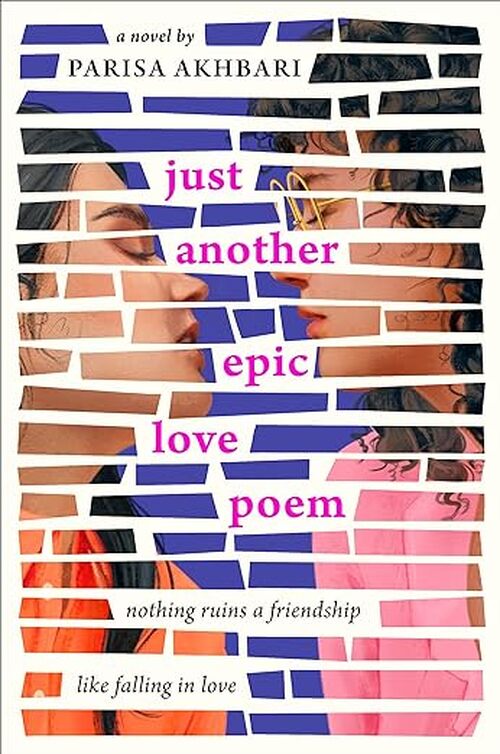I’m a sensory person. Writing reels me in when it’s rooted in taste, touch, sound, sight, and smell. When writing my contemporary young adult novel, JUST ANOTHER EPIC LOVE POEM, I wanted to deliver to readers the Iranian American cultural experiences of the protagonist, Mitra, through the tastes and smells and textures of her family’s Iranian recipes.
In an Iranian household, food isn’t just sustenance–it’s sacred. Meals like ghormeh sabzi and fesenjan take all day to prepare; rice is soaked, rinsed, washed, and rinsed again; vibrant saffron threads are folded into fragrant stews. Hospitality is at the heart of Persian cooking. The Farsi equivalent of bon appetit–nooshe jaan–literally translates to “may your soul be nourished.”
In Just Another Epic Love Poem, Iranian food weaves through Mitra’s life as its own character, an entity with which she exists in complex relationship. Ever since her family’s separation, caused by her mother Jaleh’s addiction, Mitra has lost connection to certain dishes she used to share with her mom. Ash-e reshteh, the earthy, herb-infused noodle soup served on Iranian holidays, no longer symbolizes good luck and the possibility of life’s different paths for Mitra; now it serves up grief.
As her mother attempts to reconnect with her over the course of the novel, Mitra is weary of allowing her mother back into her heart. She doesn’t want to eat the special Nowruz dinner Jaleh has prepared. Accepting the toasty-crisp bites of tahdig, a fried rice crust, feels like forgiving her mom. Mitra can’t even bring herself to crack the seal on a jar of coveted sour cherry preserves Jaleh gives her. Tasting a sip of her mother’s majoon, a smoothie of banana, coconut and dates, drags Mitra back to childhood memories of singing folk tunes with her mom over breakfast. Eating is more than a daily necessity for Mitra, as for many Iranian Americans. It connects her to meaning, to memory and emotion. It’s relationship-defining. When Mitra chooses to help her sister swirl roses of batter into a pan of hot oil to make zoolbia for her mother, she’s communicating something significant. In those crunchy, sweet florets of saffron-scented pastry, Mitra is reaching out for her mother, extending an open hand.
In honor of Mitra, I’m sharing recipes from the Iranian cuisine featured in Just Another Epic Love Poem, from two of the most beloved Iranian American chefs around. If you haven’t indulged in the slow-paced sensory pleasure of Iranian cooking, I hope you’ll give one of these recipes a try. Maybe you can savor them on a break between chapters of Just Another Epic Love Poem. Nooshe jaan!
Kuku (Fresh herb and barberry frittata)
Recipe by Najmieh Batmanglij, featured in The New York Times
Kuku is the first dish Mitra cooks with her mother after Jaleh re-enters her life. They make kuku for Nowruz, the Persian New Year, a time for fresh starts and positive intention. If you haven’t had kuku before, it really does taste like spring sunshine on your tongue.
INGREDIENTS
Yield: 6 servings
½ cup plus 1 tablespoon extra-virgin olive oil
2 medium yellow onions, finely chopped
6 eggs
1½ teaspoons coarse sea salt
1 teaspoon ground black pepper
1 teaspoon baking powder
½ teaspoon ground cinnamon
½ teaspoon freshly ground nutmeg
½ teaspoon ground cardamom
½ teaspoon ground turmeric
¼ teaspoon ground cumin
½ teaspoon ground rose petal (optional)
1 cup finely chopped parsley
1 cup finely chopped cilantro
1 cup finely chopped fresh dill
1 tablespoon dried fenugreek leaves (optional)
½ cup coarsely chopped walnuts
½ cup finely chopped romaine lettuce
½ cup finely chopped spring onions, white and green parts
2 garlic cloves, grated on a Microplane or minced
1 tablespoon rice flour
⅓ cup dried barberries or cranberries, soaked in cold water for 15 minutes, rinsed and drained
1 teaspoon grape molasses, or substitute sugar
Lavash, for serving (optional)
Yogurt, for serving (optional)
PREPARATION
Step 1
Heat ¼ cup of the oil in a large skillet over medium heat. Add onions and cook until lightly golden all over, 15 to 20 minutes. Transfer onions to a medium bowl and cool to room temperature; reserve skillet.
Step 2
Heat oven to 400 degrees and line a 9-x-12-inch baking dish with parchment paper.
Step 3
In a large bowl, lightly whisk to combine eggs, salt, pepper, baking powder, all of the spices and the rose petal, if using. Add caramelized onions, all of the herbs, walnuts, lettuce, spring onion, garlic and rice flour. Fold just to combine; do not overmix.
Step 4
Brush prepared baking dish with ¼ cup oil. (It may look like a lot, but it gets absorbed into the batter.) Add batter, smoothing out the top and pushing it to the sides. Bake until center is set, about 20 minutes, and transfer to a cooling rack.
Step 5
Meanwhile, place the skillet used to cook the onion over medium heat. Add remaining 1 tablespoon oil, the barberries, grape molasses or sugar and 2 tablespoons water. Simmer, stirring, until liquid is reduced and fragrant, about 4 minutes.
Step 6
Top cooked kuku with caramelized barberries and cut into 6 equal pieces. Serve hot or room temperature, with lavash and yogurt, if desired.
Ash-eh Reshteh
Recipe by Samin Nosrat, featured in The New York Times
After leaving Jaleh, Mitra’s father stopped making ash-e reshteh on holidays. Jaleh serves the good-luck noodle soup for Mitra and her sister at their Nowruz dinner.
INGREDIENTS
Yield: 8 to 10 servings (about 4 quarts)
¼ cup dried chickpeas
¼ cup dried white beans, such as navy or cannellini
Fine sea salt and freshly ground black pepper
2 pounds spinach
1 pound cilantro (about 3 large bunches)
1 pound Italian parsley (about 3 large bunches)
2 large bunches dill
1 large bunch chives
About 20 large fresh mint leaves
6 tablespoons plus ⅓ cup extra-virgin olive oil
2 large yellow onions, 1 finely chopped and 1 thinly sliced
2 garlic cloves, minced
1 cup dried green or brown lentils
½ teaspoon ground turmeric
2 quarts chicken or beef stock (preferably homemade), or water
1½ cups liquid kashk (Persian sun-dried yogurt or whey), plus ½ cup, for serving
8 ounces reshteh (Persian soup noodles)
1 tablespoon dried mint
PREPARATION
Step 1
The night before you plan to cook, place chickpeas and white beans in a medium bowl. Add a generous pinch of salt and 2 cups water. Refrigerate overnight.
Step 2
The night before or just before cooking, prepare the herbs and greens: Wash spinach, cilantro and parsley, then use a salad spinner to dry very well. Run a knife through the spinach to cut leaves into large pieces. Trim the woody ends from cilantro, parsley and dill so that only leaves and tender stems remain. Roughly chop cilantro, parsley, dill, chives and mint leaves into pieces no larger than a quarter. If preparing ahead of time, wrap chopped greens and herbs in plastic bags and refrigerate overnight.
Step 3
To cook, set a large (at least 10-quart) Dutch oven or stockpot over medium heat and add 4 tablespoons oil. When the oil shimmers, add the chopped onion and a generous pinch of salt. Cook, stirring regularly, until the onion is tender and golden brown, 16 to 18 minutes. Add garlic and cook, stirring constantly, for 1 minute.
Step 4
Drain the beans and add to onion along with the lentils, turmeric and 1 teaspoon pepper. Cook for 2 minutes, stirring to coat the beans with oil and spices. Add the chopped spinach and herbs, along with stock or water, and stir to combine. Partly cover the pot with a lid and bring to a boil, then reduce the heat to simmer the soup for 1 hour, stirring regularly to prevent the greens from sticking and burning. If the soup remains very thick even after the greens have wilted, add another 1 to 2 cups water, as needed to thin it.
Step 5
Place 1½ cups kashk in a medium bowl. Add a ladle or two of hot soup and whisk to dissolve, then add the mixture to the pot. The kashk will change the color of the soup from bright to milky green. Increase the heat and bring the soup to a boil, then break the noodles in half and add to the pot. Stir gently to mix in the noodles and keep them from sticking together, then reduce heat and simmer, stirring occasionally, until noodles are soft and chewy and the beans are completely tender, about 30 minutes.
Step 6
In the meantime, prepare the garnishes: Set a medium frying pan over medium-high heat. When the pan is hot, add 2 tablespoons oil. When the oil shimmers, add sliced onion and a generous pinch of salt. Cook, stirring regularly, until golden brown and caramelized, 16 to 18 minutes. Spread cooked onion onto a paper towel-lined plate to absorb excess oil; let cool. Wipe out pan and return to medium heat. Add remaining ⅓ cup oil and warm gently over low heat, then stir in dried mint and remove from heat. Set mint oil aside and allow to steep for at least 5 minutes.
Step 7
Place remaining ½ cup kashk in a small bowl and thin out with a few tablespoons of water until it’s the texture of thin yogurt. Set aside.
Step 8
The soup should be as thick as a hearty chili. If it’s any thicker, thin it with water, ½ cup at a time. Taste and adjust the seasoning with salt as needed, accounting for the fact that both the noodles and the kashk are well salted.
Step 9
To serve, ladle soup into individual bowls. Drizzle with reserved kashk and mint oil, then top with a sprinkling of golden onions.
JUST ANOTHER EPIC LOVE POEM by Parisa Akhbari
Best friendship blossoms into something more in this gorgeously written queer literary romance.
Over the past five years, Mitra Esfahani has known two constants: her best friend Bea Ortega and The Book—a dogeared moleskin she and Bea have been filling with the stanzas of an epic, never-ending poem since they were 13.
For introverted Mitra, The Book is one of the few places she can open herself completely and where she gets to see all sides of brilliant and ebullient Bea. There, they can share everything—Mitra’s complicated feelings about her absent mother, Bea’s heartache over her most recent breakup—nothing too messy or complicated for The Book.
Nothing except the one thing with the power to change their entire friendship: the fact that Mitra is helplessly in love with Bea.
Told in lyrical, confessional prose and snippets of poetry Just Another Epic Love Poem takes readers on a journey that is equal parts joyful, heartbreaking, and funny as Mitra and Bea navigate the changing nature of I love you.
Young Adult Romance | LGBTQ [Dial Books, On Sale: March 12, 2024, Hardcover / e-Book, ISBN: 9780593530498 / eISBN: 9780593530511]
Buy JUST ANOTHER EPIC LOVE POEM: Amazon.com | Kindle | BN.com | Apple Books | Kobo | Google Play | Powell’s Books | Books-A-Million | Indie BookShops | Ripped Bodice | Walmart.com | Target.com | Amazon CA | Amazon UK | Amazon DE | Amazon FR
About Parisa Akhbari
Parisa Akhbari is a mental health therapist and writer from Seattle, Washington. Her debut YA novel, Just Another Epic Love Poem, follows two queer best friends in Catholic school as they fall in love through the pages of a never-ending poem they’ve been writing back and forth for five years.When not writing or therapizing, Parisa can be found trying to replicate her grandmother’s drool-worthy Persian recipes, riding ferries around the Puget Sound, and dancing around the kitchen with her wife and dogs. Sign up for her newsletter for a monthly dose of fun arts and culture finds with a spotlight on marginalized creators.




No Comments
Comments are closed.